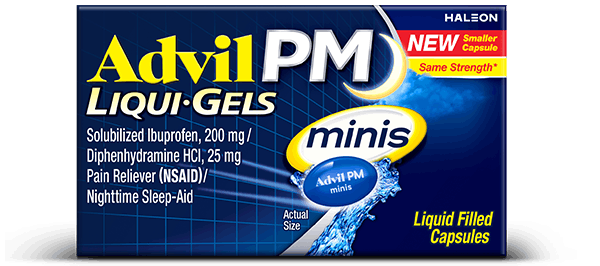What are the different types of headaches?

Headaches are common; over the span of a year, nearly 90% of men and 95% of women will experience one.1 While headaches themselves are generally manageable with self care, they may be indicative of other conditions.2 The primary symptom of a headache is pain in the head or face, though different types of headaches have other symptoms.2 Learn about different types of headaches and taking ibuprofen for headaches.
Tension Headaches
The most common headache, tension headaches feature a steady ache that may appear on both sides of the head, rather than just one.3
What Are Symptoms of a Tension Headache?
A tension headache may be identified by these common signs:3
- Dull pain that may feel like your head is in a vice, or like pressure on your head
- A slow start to the headache
- Pain that is mild or moderate, but not severe
- Pain may also appear in the neck or back of the head
The cause for tension headaches isn’t known, but factors like genetics, environment, and stress experienced by an individual are thought to contribute.3
Cluster Headaches
Cluster headaches are very severe, relatively rare and occur in periods of frequent attacks known as clusters.4 They frequently occur on one side of the head or around an eye and may cause enough pain to wake someone from sleep.4
What Are the Symptoms of Cluster Headaches?
Cluster headaches come on quickly, often without warning.4 A cluster period often involves multiple headaches a day over a period of several days. Common symptoms include:
- Sudden, debilitating pain on one side of the head
- Watery eyes
- Nasal congestion or runny nose on the same side of the face
- Restlessness, inability to get comfortable
- Drooping eyelid on the side experiencing the pain
If you’ve just started to experience these kinds of headaches, consult with a healthcare professional about treatment and to rule out other medical conditions. Seek emergency treatment if your headaches are accompanied by fever, nausea, vomiting and trouble speaking; this may be indicative of a stroke or meningitis.4
Migraine Headaches
Migraines are a common type of headache characterized by a throbbing, often debilitating pain that is usually felt on only one side of the head and can last anywhere from four to 72 hours.5 Migraines are common, affecting about 12% of Americans and can interfere with your daily routine, keeping you from meeting personal and professional obligations.5
What Are the Symptoms of Migraines?
Each migraine is different, and there are multiple types of migraines (like ocular migraines ) but there are a few common symptoms that may indicate that you’re experiencing this kind of headache:1,5
- Fatigue and weakness
- Visual disturbances
- Difficulty concentrating
- Nausea and vomiting
- Sensitivity to light, sound, and smell
The throbbing pain of a migraine is often localized on one side of the head, but may switch from one side to another or expand to the area around the eyes, sinuses, jaw or temples.5 These headaches are unpredictable, with some people experiencing an average of two to four in a month.5 Migraines do tend to run in biological families, which means that if a parent experiences them, you may as well.5
What Helps Headaches?
Effectively treating a headache may depend on the type of headache you’re experiencing, and how frequently you have them.2 Keeping a headache log, with information about when they happen and the circumstances surrounding them can help you determine what triggers your headaches in the first place.2
A trigger is an event that causes headache symptoms to start.5 A psychological trigger may include stress or anxiety, while an environmental trigger may be more along the lines of strong scents, weather changes, consuming caffeine or food sensitivities.2,3 Physical triggers like lack of sleep or poor posture may lead to tension headaches.2,3 Taking the time to identify what is causing your headaches can help you identify the best course of action for treating them. If identifying or avoiding specific triggers proves troublesome, you may need to speak with a healthcare provider to help manage your headaches.2
If your headaches are caused by health problems like high blood pressure, addressing this may also address your headaches.2 In some instances, you may be able to remedy a headache through relaxation techniques like meditation and deep breathing, and by listening to your body and recognizing how you respond to stressful situations.2
Does Ibuprofen Help Headaches?
Unfortunately, there isn’t a cure for headaches; treatment is focused on relieving symptoms and trying to prevent future headache episodes.2 If holistic treatments and lifestyle changes aren’t effectively managing the pain you feel, turning to over-the-counter medicines, like NSAIDs may be your next step.2,3Non-steriodal anti-inflammatory drugs (NSAIDs) are a class of medications that are used to treat and manage pain and other inflammatory issues like fever.6 NSAIDs, like ibuprofen, are often taken orally; their analgesic effects make them effective for treating headaches and migraines.6
Ibuprofen is the primary ingredient in Advil pain products – which are built for speed to fight headache pain . When taken as directed, ibuprofen provides fast and effective pain relief that is effective and well-tolerated when used as directed . An oral ibuprofen dose for adults is 1 to 2 200mg tablets every 4-6 hours, with a daily limit of 1200mg, while headache symptoms persist.6
Manage headache pain with Advil Tablets , the #1 ibuprofen pain reliever for tough pain, day or night . For those who suffer from migraines, Advil Migraine is clinically proven to relieve migraine pain and related symptoms like nausea and sensitivity to light and sound.
SOURCES
1. What type of headache do you have? Harvard Health Publishing. https://www.health.harvard.edu/healthbeat/what-type-of-headache-do-you-have. Accessed 4/29/25.
2. Headaches. Cleveland Clinic. https://my.clevelandclinic.org/health/diseases/9639-headaches. Accessed 4/29/25.
3. Tension Headaches. Johns Hopkins Medicine. https://www.hopkinsmedicine.org/health/conditions-and-diseases/headache/tension-headache. Accessed 4/29/25.
By clicking the link(s) above, you will be taken to an external website that is independently operated and not managed by Haleon. Haleon assumes no responsibility for the content on the website. If you do not wish to leave this website, do not click on the links above.




